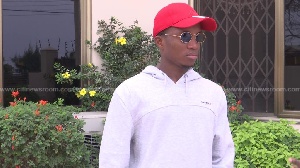- Home - News
- TWI News | TV
- Polls
- Year In Review
- News Archive
- Crime & Punishment
- Politics
- Regional
- Editorial
- Health
- Ghanaians Abroad
- Tabloid
- Africa
- Religion
- Election 2020
- Coronavirus
- News Videos | TV
- Photo Archives
- News Headlines
- Press Release
General News of Thursday, 9 February 2006
Source: Ghanaian Chronicle
Attorney General's Application Fails
An Accra High Court, hearing a suit initiated by Mr. Tsatsu Tsikata, against the Chief Justice and the Attorney General, has rejected an application by the Attorney General, Mr. Ayikoi Otoo, seeking to stay proceedings and refer the case to the Supreme Court.
The court presided over by Justice Ofori-Atta, fixed February 13, 2006 to commence the hearing of the case.
Mr. Tsikata, former Chief Executive of the Ghana National Petroleum Corporation (GNPC), is claiming that in view of Article 128(2) of the Constitution which states, "The Supreme Court shall be duly constituted for its work by not less than five Supreme Court Justices..." a judgment delivered by the Supreme Court sitting with "only four" of its Justices on November 8, 2004 is null and void. Mr. Tsikata is also seeking an injunction against the defendants, restraining them from taking any steps based on the purported judgment.
In his ruling on February 6, 2006, Mr. Justice Ofori-Atta indicated that after reading from the statement of claim filed by the Plaintiff and the statement of defence filed by the Attorney-General for both defendants, the issue before the court was as to whether or not five Justices of the Supreme Court heard the appeal of Mr. Tsikata when it came before the Supreme Court.
Basing himself on decided cases in the Court of Appeal and the Supreme Court, the court held that he did not have to refer the matter to the Supreme Court.
The Attorney General on January 30, 2006, argued that the judge, under Article 130 (2) of the Constitution, was required to stay proceedings before him and refer the matter to the Supreme Court for determination.
According to the Attorney General, Article 130 (1) of the Constitution gives the Supreme Court exclusive jurisdiction in all matters involving interpretation and enforcement of the Constitution.
The Attorney General further referred to Article 157(2) of the Constitution and submitted that Mr. Justice Brobbey could not withdraw from the panel deciding the case.
Replying to the submissions of the Attorney General, junior Counsel for the former GNPC boss, Major R.S Agbenoto, argued that there was no issue of interpretation and enforcement of the Constitution at stake in the case.
According to plaintiff's counsel, the constitutional provision about not less than five Justices of the Supreme Court being needed for the Court to do its work was clear and unambiguous, noting that the court was only being asked to apply this clear provision to the factual circumstances of the case.
The court had to hear evidence, determine factual matters and simply apply the Constitution, counsel argued, emphasizing that by the time Mr. Justice Brobbey was appointed Chief Justice of the Gambia, the case had not been heard.
Additionally, counsel pointed out that upon his appointment and assumption of office in The Gambia, Justice Brobbey had not participated in the hearing and determination of the case and could not, therefore, deliver an opinion.
Article 157(2) of the Constitution was of no relevance, counsel noted, since Mr. Justice Brobbey had not heard the arguments in the case before his departure for The Gambia.










